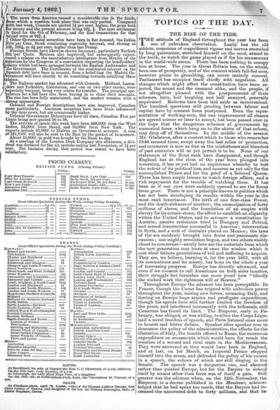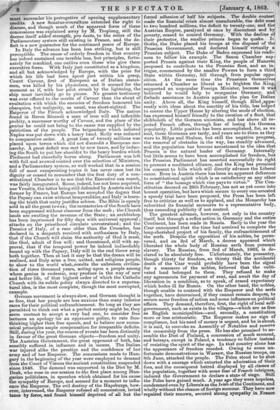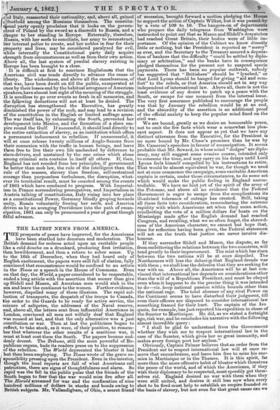TOPICS OF THE DAY.
THE RISE OF THE TIDE. THE attitude of England throughout the year has been one of unbroken observation. Lazily has the old athlete, conscious of magnificent vigour and nerves recruited by long quiescence, stretched. himself on the sand, armed to the teeth, to watch the game' played as if for his amusement in the world-wide arena. There has been nothing to occupy him at home. The year in Great Britain has, on the whole, been one of prosperity, and of the content whioh full-fed men, however prone to grumbling, can never entirely conceal. Parliament has occupied itself chiefly with negations. All changes which might affect the constitution have been re- jected, the sound and the unsound alike, and the people, if not altogether pleased with the postponement of their schemes, have, half laughing and half annoyed, generally acquiesced. Reforms have been laid aside as inconvenient. The hundred questions still pending between labour and capital have by consent been postponed. Even the repre- sentation of working-men, the one improvement all classes are agreed sooner or later to accept, has been passed over in the hope that the dangerous schemes of government by numerical force, which hang on to the skirts of that reform, may drop off of themselves. In the middle of the session Mr. Gladstone, after a contest which to those who remember 1846 seemed tame, swept away the last relics of protection, and commerce is now as free as the misfortunes and blunders of past centuries will as yet permit it to be. None of our statesmen of the front rank have disappeared, and though England has at the close of the year been plunged into mourning, it has as yet had no experience whereby to test the extent of its political loss, and mourns as yet only for the accomplished Prince and for the grief of a beloved Queen. There has been ample leisure to watch foreign affairs, and a rich repayment for the trouble of watching them. It has been as if our eyes were suddenly opened to see the forest trees grow. There is not a principle known in politics' which has not been developing its results within the year in the moat rank luxuriance. The birth of one first-class Power, and the death-sickness of another; the emancipation of fort; millions of slaves, and the foundation of an empire with slavery for its corner-stone; the effort to establish an oligarchy within the United States, and to octroyer a constitution in Austria; passive resistance tried in Hungary and Poland, and armed insurrection successful in America ; intervention in Syria, and a writ of distraint placed on Mexico ; the laws of the sea suddenly brought into fierce and passionate dis. cussion ; one mighty revolution begun, and two others visibly about to commence—surely here are the materials from which the new generation may learn at once the wisdom which it cost their fathers generations of toil and suffering to acquire. They are, we believe, learning it, for the year 1861, with all its commotions and its misery, has been on the whole a year of increasing progress. Europe has directly advanced, and even if we consent to call Americans on both sides lunatics, their struggle but furnishes one more proof how " blindly the wicked work the righteous will of Heaven."
Throughout Europe the advance has been perceptible. In France, though the Caesar has reigned with unbroken power throughout the year, raising new forces, menacing Italy, and forcing on Europe huge armies and profligate expenditure, though his agents have still further limited the freedom of the press, and interfered incessantly with the tribunals, still Camarism has found its limit. - The Emperor, early in Fe- bruary, was obliged, or was willing, to allow the Corps L6gis- latif a novel freedom of speech, and Paris listened once more to honest and bitter debate. Speaker after speaker rose to denounce the policy of the administration, the efforts for the liberation of Italy, the insults offered to Rome, the enormous expenditure on armaments which would have for result the creation of a second and rival state in the Mediterranean. They were answered as they would have been in England, and at last, on 1st March, an Imperial Prince stepped himself into the arena, and defended the policy of his cousin in a speech, the echoes of which are still ringing in the Senate. The speech was a dangerous one, and alarmed rather than quieted Europe, but for the Empire to defend itself by means other than force was of itself a gain. Still greater was the advance when, on the 12th November; the Emperor, in a decree published in the lifonitour, acknow- ledged that he had spent too much, that the Empire had in- creased' the uncovered, debt to forty millions, and that he to show to the world what...results the unbroken crviliza- death of the Czar would probably have been the signal tion of three thousand years, acting upon a people among for a massacre of the nobles, believed that the culti- whom genius is endemic, may produce in the way of new vated land belonged to them. They refused to make tural idea, is the most complete, though the most corrupted, which bodes ill for Russia. On the other hand, the nobles, example. though unable to contend with the Emperor and the serfs German movement is always slow, and German thought is together, have determined, if they cannot remain despots, to so free, that her people are less anxious than many inferior secure some freedom of action and some influence on political races for their political enfranchisement. So long as they are affairs. They demand, therefore, first, the right of local self- permitted to think out what a perfect society might be, they government, such as exists in the villages—which are as free seem content to accept a very bad one, to consider free as English municipalities—and, secondly, a constitution lectures an apology for an oppressive police, to rate free- more or less aristocratic. The Emperor makes no sign of thinking higher than free speech, and to believe new econo- compliance, but his need of money is urgent, and he is about, mica! principles ample compensation for irreparable deficits. it is said, to convoke an Assembly of Notables and remove Still, during the year, the course of events has been distinctly the censorship from the press. He has also promised to as- in favour of the. great German objects—freedom and unity. semble the Diet of Finland, a concession of much moment, The Austrian Government, the great opponent of both, has and betrays, except in Poland, a tendency to follow instead sensibly suffered in influence and in means. The Italian of resisting the spirit of the age. In that country alone has war injured alike the prestige and the confidence of her the appearance of freedom receded. Owing to some un- army.and of her Emperor. The concessions made to Hun- fortunate demonstrations in Warsaw, the Russian troops, on wiry in the beginning of the year were employed to demand 8th June, attacked the people. The Poles stood to be shot from the Court of Vienna the ancient constitution suspended down with a courage which extorted the admiration of their since 1848. The demand was supported in the Diet by M. foes, and the consequent hatred displayed by all classes of Deak, who rose in one session to the first place among Hun- the population, together with some fear of French intrigues, garian politidans, in speeches which obtained for his cause induced the .Government to declare a state of siege. Still the sympathy of Europe, and seemed for a moment to influ- the Poles have gained much. A year ago they were hopeless, once the Emperor. The evil destiny of the Hapsburgs, how- condemned even by Liberals as the Irish of the Continent, and ever, intervened, the Emperor refused all concessions, levied wholly without the chance of foreign succour. They have now taxes by force, and found himself deprived of all but the repaired their renown, secured strong sympathy in France must surrender his prerogative of opening supplementary forced adhesion of half his subjects. The double contest credits. A new Senatus-consultum extended the right to made the financial crisis almost unendurable, the debt rose discuss, and though much of the apparent force of these to two hundred millions, the deficit to twenty-one, and tbe concessions was explained away by M. Troplong, still the Austrian Empire, paralyzed at once by discontent and byi decree itself added strength, pro tont°, to the relics of the poverty, ceased to control Germany. With the decline of Parliamentary system still existing in France, and the de- their protector, the smaller princes began to quake. It, ficit is a new guarantee for the continued peace of Europe. Gotha, the Duke placed his troops at the disposal of the In Italy the advance has been less striking, but is still Prussian Government, and declared himself virtually a perceptible. The cause of orderly freedom in that country Prussian subject. The Duke of Baden expressed his readi-, has indeed sustained one terrible loss, but principles, fortu- nese to follow his example. The Saxon Chamber supi nately for mankind, can outlive even those who give them ported Prussia against their King, the people of Hanovei, executive force. With Italy just constituted as a kingdom, proposed to contribute to the Prussian fleet, and an in-' and all but acknowledged by Europe, with the prize for trigue, commenced by the smaller Powers to form a third which his life had been spent just within his grasp, State within Germany, fell through from popular oppo, Count Cavour, first of European as of Italian states- sition. At the same time the Prussians themselves men, was killed by his physicians, and it seemed for the returned a Chamber so liberal as to frighten the King moment as if, with her pilot struck by the lightning, the supported an unpopular Foreign Minister, because it wai, ship must inevitably go to pieces. No greater testimony believed he would help to reorganize Germany, and was ever offered to the merits of Cavour than the shout of forbade assistance to Austria against the plan for Italian exultation with which the enemies of freedom honoured his unity. Above all, the King himself, though filled .appal obsequies, but malignity, as usual, was short-sighted. The rently with ideas about the sanctity of his title, has helped Eniperor of the French acknowledged Italy. The nation to coerce the -Upper House by altering the mode of election, found in Baron Ricasoli a man of iron will and inflexible has expressed himself friendly to the creation of a fleet, that probity, a successor worthy of Cavour, and the place of the shibboleth of the German unionists, and has above all re- genius he could not bring to the cause was supplied by the jetted French offers, through fear of losing his German patriotism of the people. The brigandage which infested popularity. Little positive has been accomplished, for, as we Naples was put down with a heavy band. Sicily was reduced said, these Germans are tardy, and years are to them as they to comparative order. A great loan of twenty millions was were to Hilpa and Shalum, but still the negative progress, placed upon terms which did not discredit a European mo- the removal of obstacles in the way, has steadily advanced, narchy. A great deficit was met by new taxes, and by induc- and the population has become accustomed to the idea that ing the South to put her shoulder to the heavy burden which Prussia is the natural leader of Germany. Internally Piedmont had cheerfully borne along. Parliament was left but little seems to have been accomplished for freedom, but with full and avowed control over the selection of Ministers, the Prussian Parliament has asserted successfully its right and a Parliamentary system, so well worked that in a session to prevent a meditated alliance, and the King has promised full of most exasperating topics it has never once lost its his consent to bills which will directly advance the Liberal dignity or ceased to remember that the first duty of a con- cause. Even in Austria there has been an apparent deference stitutional Chamber is to see that the Executive can march, to constitutional spirit which is as satisfactory as any other was fairly inaugurated. Rome, indeed, has not been acquired, form of " the homage which vice pays to virtue." The Con- nor Venetia, the latter being still defended by Austria and the stitution decreed on 26th February, has not as yet come into former by France, but Europe has accepted the dogma that honest operation, but laws which secure to every one arrested the Papacy can exist without temporalities, and Italy is learn- a speedy trial have been proposed, the Press has been left ing the truth that unity justifies schism. The Bible is openly free to criticize as well as to applaud, and the Monarchy has sold in all the great towns ; the monasteries of the South have submitted its financial measures to a representative body, been suppressed without clamour from the mob ; the Church thus conceding publicity if not control. 7iid Italy, reasserted their nationalil,tTd,aboell,gainedii foothold among the Russisthelsevestcosti constitu- onal party openly proclaims that it looks on the govern- ent of Poland by the sword as a discredit to Russia, and a d ger to her standing in Europe. Externally, therefore, ussia, with her serfs to conciliate, her army to reconstruct, her internal police to create, and her nobles in fear for their slovperty and lives, may be considered paralyzed for evil, hile internally the Constitutional party daily acquire ngth from circumstances as well as from their own action. hove all, the last system of prmdial slavery existing in Europe has been brought to a close. 1 It is difficult at first to convince Englishmen that the .American civil war tends directly to advance the cause of liberty. The wickedness, and above all the ceaselessness, of that war, have been dwelt on till the public, exasperated at once by their losses and by the habitual arrogance of American speakers, have almost lost sight of the meaning of the struggle. It is needless to go over events so fresh in all memories, and the following deductions will not at least be denied. The disruption has strengthened the Executive, has greatly diminished the power of the mob, and may lead to a revision of the constitution in the English or limited suffrage sense. The war itself has, by exhausting the South, prevented her development into Mexico, and the formation of a slave em- pire round the Gulf. If successful, it should lead directly to the entire extinction of slavery, as an institution which offers aNirrmanent inducement to rebellion. If unsuccessful, it will at once release twenty millions of Anglo-Saxons from their connexion with the traffic in human beings, and leave them free to live their own life unchecked by deference to slave-drivers, and unstained by the one crime which alone among criminal acts contains in itself all others. If, then, England has not receded from her principles, if government be better than mob law, the rule of the intelligent than the rule of the masses, slavery than freedom, self-restrained courage than purposeless turbulence, the disruption, what- ever its territorial result, must be counted among the events of 1861 which have conduced to progress. With Imperial- ism in France surrendering prerogatives, and Imperialism in Austria talking of constitutions, Italy rising into' her place as a constitutional Power, Germany blindly groping towards unity, Russia voluntarily freeing her serfs, and America driven as by an avenging Providence into the path of eman- cipation, 1861 can only be pronounced a year of great though fitful advance.




































 Previous page
Previous page